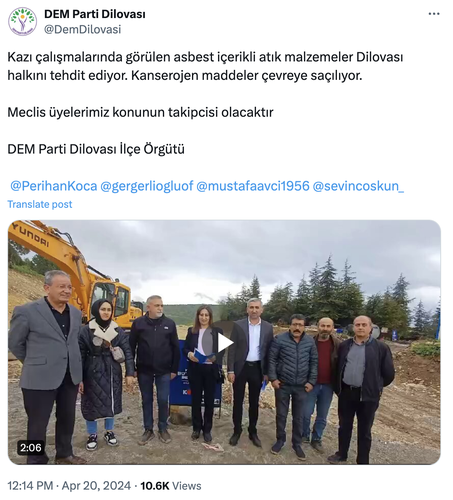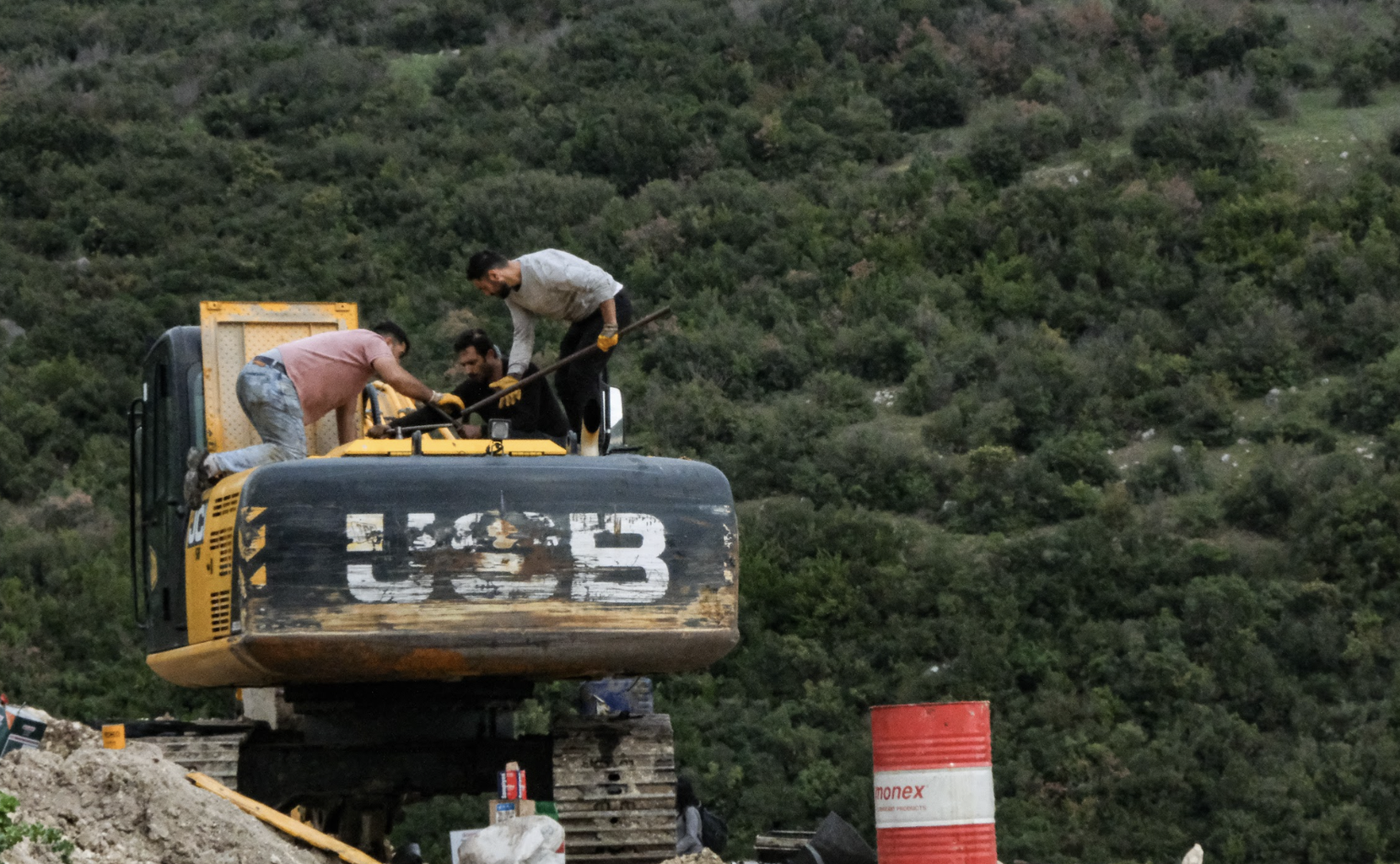Turkey’s Minister of Environment has yet to address parliamentary questions from opposition lawmakers about the asbestos at Izocam Hill in Dilovası, a small industrial town in Kocaeli, outside Istanbul.
After The Black Sea's report last month into Kocaeli's authorisation of roadworks through an illegal dump that contains asbestos, several MPs submitted official questions to Mehmet Özhaseki, Turkey's Minister of Environment, Urbanisation and Climate Change.
Construction began in March on a new road project in Dilovası, part of which involves the excavation of a decades-old illegal landfill containing hazardous waste and asbestos.
The MPs, from the Republican People’s Party (CHP), the Peoples' Equality and Democracy Party (DEM Party) and the Democracy and Progress Party (DEVA Party), wanted to know how the government intended to protect the lives of workers and locals. One of them, Omer Faruk Gergerlioğlu, a medical doctor and the elected DEM Party MP for Kocaeli, also questioned Fahrettin Koca, the Minister of Health, about the site.
Menga Insaat, the construction company carrying out the work, is already aware of the dangers to their workers. As are the Kocaeli municipality and the mayor of Dilovası. The ministries of health and environment are now added to the list. The news did nothing to bring the work to a halt.
DEM Party deputy Perihan Koca told The Black Sea that the unaddressed asbestos and hazardous waste there are “sheer elements of murder,” adding that the ministry’s unanswered questions and lack of intervention are evidence of deliberate negligence.
Turkey’s constitution requires ministers to reply within 15 days. The first deadline passed on 1 May. “Not answering parliamentary questions has become their style now. This is what the much-vaunted presidential system is. They have no concern about being accountable.
“The ministry has not taken any steps regarding the dump, which was proved through laboratory results to contain asbestos. It has not stopped the roadworks on the hill. Turning a blind eye to what is happening and taking no measures for public health cannot be explained by negligence,” Koca said.
“cheap labour” while “spreading poison”
DEM Party council members visited Izocam Hill in April after the publication of our story and held a press briefing to announce they would raise the issue at council meetings. They said, “The waste materials containing asbestos that come up with the excavation works are threatening the lives of the Dilovası public. Carcinogenic substances are spreading around.”
They later submitted a set of questions to the Kocaeli and Dilovası municipalities asking about the steps taken in the five years since The Black Sea uncovered the scandal and how they proposed to protect the lives of the construction workers.
Eylem Guleser, a DEM council member, told us that weeks have now passed with no action taken. “The construction workers, the residents, all living things in nature, are at risk of this asbestos because of the ongoing roadworks at the hill,” she said.
“Dilovası suffers from plenty of environmental pollution due to being an industrial zone,” she said. “Not a day passes without us facing yet another problem. That officials do not take any measures on environmental and health problems directly affecting the public shows how little they care about the people of Dilovası and the environment.”
Deputy Gergerlioğlu paid a second visit to Izocam Hill on 1 May and strongly condemned the likes of EU companies that open factories in Dilovası to take advantage of “cheap labour” while “spreading poison.”
“Where we are standing is called Izocam Hill,” he said during his visit. “The waste of the Izocam factory has been buried right here. This waste contains asbestos, and asbestos is an extremely dangerous material. It is a material that causes mesothelioma in the lungs and other diseases in the body.”

He later told The Black Sea that he had discussed the issue with the workers, who seemed uninformed. “They don’t know anything,” he said. “They ask ‘Is there really something like [asbestos] here?’ and then continue the roadwork. In time, there will be very serious and permanent effects.”
A journalist for the local online news site, Gebze Emek, attended a council meeting where the mayor of Dilovası, Ramazan Ömeroğlu, a member of the ruling AKP, promised to look into the hill. The journalist reported that when the meeting ended the mayor had told him, “It is actually something that does not exist.”
“The Kocaeli Municipality chose to close their ears, and the Ministry of Environment has still not responded,” Gergerlioğlu said.
Izocam Hill investigation remains “under consideration” five years later,
This is the second occasion lawmakers have submitted questions in parliament about Izocam Hill. Back in 2019, when the original story was published, 22 MPs from CHP submitted a written motion urging an investigation into “the toxicity of the dump and take necessary precautions urgently, as well as to determine how the dump consisting of asbestos came about and who the responsible parties are.”
As with the current crop of questions, the government should have provided official written responses and voted on the motion to establish the investigative committee within 15 days. Five years later, it remains “under consideration.”
Dilovası is well known in Turkey for its environmental and health problems caused by the pollution from the number of factories in the area. Asthma and breathing problems are endemic and there is a higher rate of cancer. Tests of mothers’ breastmilk revealed the pervasive presence of heavy metals. But despite years of scandal and lawbreaking by companies little has been done to clean up the town or hold companies accountable.
As part of our Toxic Valley project, published in 2019, we had the mineral wool waste at Izocam Hill tested at a fully accredited, specialist lab. In addition to the insulation, the results revealed three types of lethal asbestos, a banned flame retardant, long known to cause cancer and other lung problems, even after a single exposure.
The 12,000 square metre dumping ground has been in Dilovası for more than thirty years and strong suspicion lies with Izocam factory, a manufacturer of mineral wool, now jointly owned by the French industry giant Saint-Gobain and the Kuwaiti firm Alghanim Industries. Until 2007, Izocam was owned by Koç Holding, Turkey’s biggest conglomerate. Witnesses and former employees told The Black Sea that during the 1980s, the company would dispose of faulty and excess products by dumping them illegally at the new road construction site.
Gergerlioğlu said: “As a doctor and deputy, I would like to reiterate my warnings to the public about the cancer cases this asbestos hill will cause in the years to come.”
